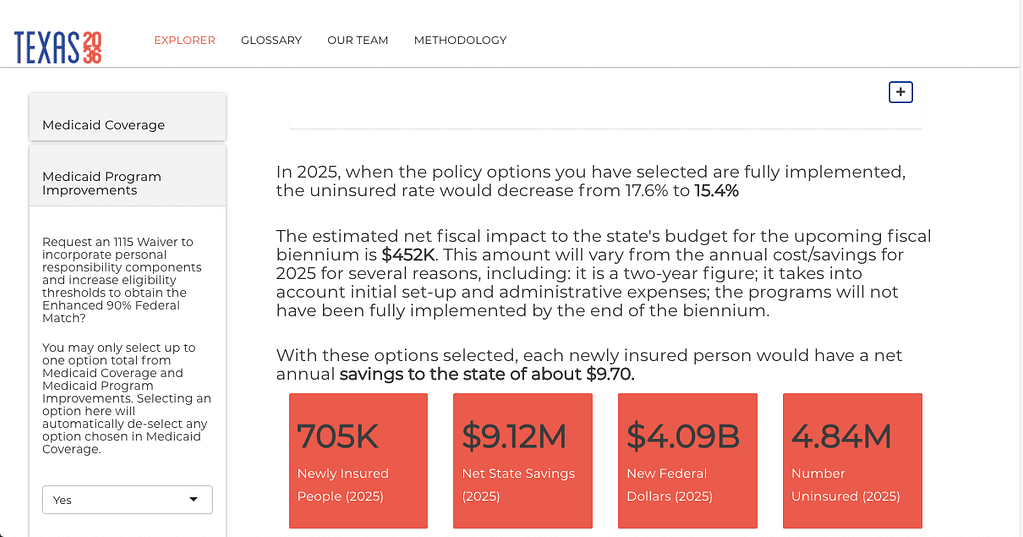Last week, the U.S. Centers for Medicare and Medicaid Services rescinded approval of Texas’ 1115 Medicaid Waiver extension.
This bureaucratic-sounding agreement — the 1115 Medicaid Waiver — provides a vital, 11-figure stream of federal funding to Texas hospitals that provide care to Texans without health insurance.
Such care is known as uncompensated care. It stems from the fact that hospitals are required to provide care to everyone, regardless of their ability to pay. Funding from the 1115 Waiver compensates hospitals for such care.
In many cases, hospitals need that money to keep their doors open.
Uncompensated care is so expensive because it often is delivered in emergency rooms to people who cannot afford such high medical bills. It’s the result of having nearly five million Texans without health insurance.
Before leaving office in January, officials in the Trump Administration approved an extension that took the waiver out to 2030. In rescinding that extension, the Biden administration cited the fact that it didn’t go through the full federal rulemaking process, which limited the amount of input that the public was able to provide. As before, the extension is now set to expire on Sept. 30, 2022.
With the highest uninsured rate in the country, Texas needs that 1115 Waiver funding, so this rescission highlights the need for both federal and state leaders to find a solution as the situation we’re in is now unsustainable.
This prospect that this critical funding might vanish creates a new sense of urgency about the discussion that Texas policymakers have been having with business, health and community leaders for years – how Texas can craft the right plan to make health coverage available for more people. Increasing health coverage would decrease uncompensated care costs, which will help keep hospitals in business.
The fact remains that far too many uninsured Texans are vulnerable to the existential threat of out-of-control medical bills. According to a recent report, Texas has the fourth-highest medical debt load in the country: 23% of Texans have medical debt in collections.
For many Texans, state and federal policy choices have left them without a realistic path to coverage. They earn too much to access Medicaid, and they don’t earn enough to qualify for federal Affordable Care Act subsidies.
So, what should Texas do?
Texas 2036’s Health Policy Explorer shows that by increasing Medicaid eligibility to 138% of the Federal Poverty Level ($17,609 a year for an adult, or $36,570 for a family of four), the legislature could direct HHSC to negotiate increased eligibility thresholds for Texas. Potential plans could newly cover between 650,000 – 700,000 Texans while saving the state between $9 – $28 million annually.
This is accomplished by the state and federal government shifting Texas’ 60/40 federal-to-state funding match to 90/10, which 38 other states have done, and would ensure Texas taxpayers are no longer underwriting the cost of coverage across the country, at the same time five million Texans remain uninsured.
Further, the Texas Voter Poll, conducted Jan. 12-18 by Baselice & Associates for Texas 2036, shows 64 percent of Texas voters support increasing Medicaid eligibility to that level. And three out of four voters think eligibility thresholds should be higher than they are today.
On top of that, the recently passed American Rescue Plan Act includes up to $3.5 billion more for Texas if it increases Medicaid eligibility to 138% of the Federal Poverty Level.
Waiver rescission or no, Texas needs to address its coverage crisis. We need a plan that will work for Texas. We also need federal officials to work with Texas on a plan that is right for our state.
Most of all, we need to increase coverage — sustainably — over the long run.
Texas needs all sides to set aside politics, focus on the data, examine all of the tools in the toolkit, and keep an open mind. With that — and the urgency of the fast-approaching 1115 Waiver expiration – we can finally create a sustainable, Texas-specific solution to this problem facing millions of Texans.

